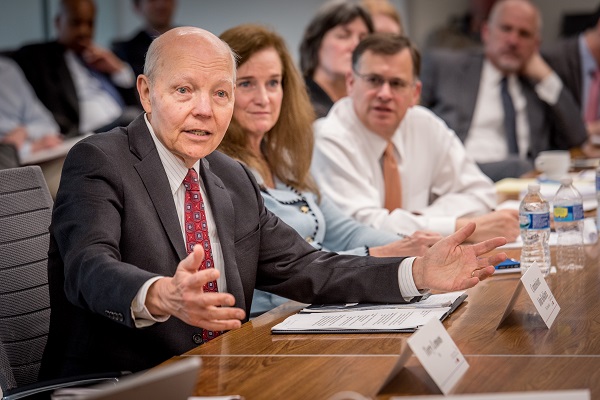AICPA Hosts Stakeholder Meeting to Discuss How to Improve IRS Taxpayer Service
February 23, 2017

The American Institute of CPAs (AICPA) hosted a day-long meeting in Washington, D.C. to discuss with other Internal Revenue Service (IRS) stakeholders how the IRS could improve the service it provides to taxpayers and tax preparers.
The February 15 meeting was convened as a continuation of the AICPA’s effort to spur policymakers to transform the IRS “into a modern functioning, evolutionary, and respected federal agency for the 21st Century,” as called for in the resolution passed by the AICPA Council in May 2015.
The meeting participants engaged in a wide-ranging discussion about taxpayer and tax practitioner service needs and potential impediments to the IRS providing high-quality service. They were joined by IRS Commissioner John Koskinen and IRS Taxpayer Advocate Nina Olson who offered their perspectives.
Last February, AICPA tax policy and advocacy staff and member volunteers spent two days in Washington, D.C. meeting with members of Congress and IRS officials to discuss the unacceptable state of taxpayer service and to launch a dialogue about the IRS of the future.
In addition, the AICPA has sought feedback about IRS service levels through member surveys and in discussions with members from across the country. Those comments have been emphasized in meetings with IRS officials to discuss the IRS Future State initiative, as well as in the meetings AICPA staff and volunteer members have had with House and Senate staff to discuss tax reform. IRS service levels have also been discussed at meetings of the AICPA Tax Executive Committee.
In testimony on May 17, 2016 at one of a series of nationwide public forums conducted by Olson to explore “What Taxpayers Want or Need from the IRS to Comply with the Tax Laws,” Troy K. Lewis, CPA, CGMA, then chair of the AICPA Tax Executive Committee, stated “To ensure that we have meaningful access to the IRS, the agency needs to regularly provide a systematic, reliable and economical source of training to their employees. In order to answer basic questions and to keep up with changing tax laws, IRS representatives need consistent, quality training, comparable to that offered to a tax practitioner. This lack of training often results in poor customer service.”
Lewis continued, “Finally, it is critical that the IRS actively pursues stakeholder (taxpayer, tax preparer and other IRS customers) engagement, particularly on major organizational changes such as the IRS Future State. Stakeholders such as CPAs, who are on the “frontline,” can provide sound recommendations to ensure the needs of taxpayers, tax practitioners and the government are met.”
At a hearing before the House Small Business Committee on February 15, Lewis told committee members that in order for the IRS to become a “Service First” agency able to meet the needs of small business owners it must focus on utilizing modern and secure technology, developing and continuing to hire and train knowledgeable employees, and tailoring processes and systems around the needs and wants of its customers.
The AICPA and other IRS stakeholders will continue efforts to improve IRS service and transform the Service into a 21st Century agency.
